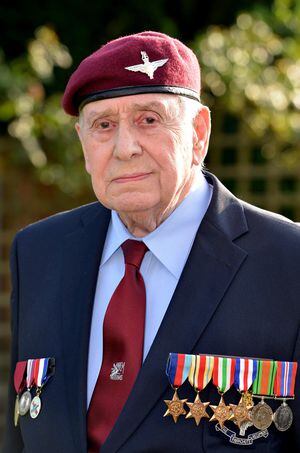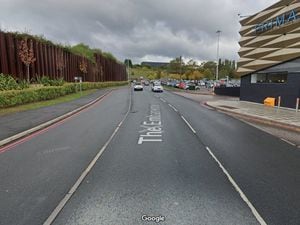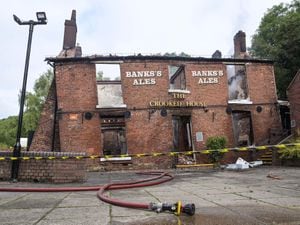Tributes to Arnhem veteran Jack Baker, 95
More than 150 people packed out a church to pay their respects to Arnhem veteran Jack Baker, who has died aged 95.

Members of Wolverhampton Parachute Regimental Association formed a guard of honour as the former lance-corporal's coffin, draped in the Union Jack, was carried into Lake Street Methodist Church in Lower Gornal.
There was standing room only inside the church as 150 people turned out to pay their respects.
Mr Baker, who lived in Sedgley for 70 years, died on April 1 after a brief illness.
Jack was just 17 years old when he joined the Royal Welch Fusiliers in 1940, having claimed he was 18.
“I was young compared to most, a boy among men," he said in a 2013 interview.
Two years later he put his name forward when he heard that volunteers were being sought for the new airborne forces. He joined the newly formed 1st Airborne Division in 1942, tempted by the opportunity of doubling his pay from two shillings a day to four, and, of course, the red beret which would attract all the girls.
He saw active service in the North Africa campaign, followed by Sicily and Italy.
“North Africa was a long campaign – the paras were supposed to be in and out but we were used as infantry," he said.
“But Arnhem was a nasty little battle.”
Indeed it was. Operation Market Garden, as it was formally known, began on September 17, 1944, and was supposed to have brought the war to a swift conclusion.
On paper, it sounded simple.
The Allied invasion of Normandy had gone better than many had expected, and there seemed little to stop the forces sweeping through northern France and Holland as they headed towards Germany.
Paratroopers and glider soldiers would be dropped in Arnhem, which was on the other side of the Rhine to other Allied forces, and seize control of the bridges on the vital route. This would pave the way for armoured units to progress towards Germany’s industrial heartlands. There was even talk of the war being over in time for Christmas.
But Allied intelligence had failed to pick up that two armoured German divisions were resting in Arnhem – leaving the Allied airborne troops out-gunned. The battle was over in nine days, in a defeat which saw 1st Airborne lose nearly three quarters of its strength, and would not see combat again.
Jack landed Oosterbeek, about five miles from Arnhem, at 1.15pm on September 17, a gloriously sunny afternoon, and was told to head for the main bridge in Arnhem.
"One of the problems was the distance from the bridge.
“We started hitting trouble on the way.
“We would go through back gardens, crawling, doing whatever it took to get there. We were in action as soon as we landed.
“To begin with it was mainly snipers, we didn’t have that many killed in 1 Para, but quite a few were wounded.
“We got within a quarter of a mile of the bridge, we never saw the bridge because of the bend in the river, but it was there that we hit the heavy stuff. They had flame throwers, tanks and heavy guns, and we just had our rifles.
"We got within about a quarter of a mile of the bridge, where we were to relieve 2 Para, when we were hit with tanks and flame throwers against our small arms.
“Lots of our lads took immediate shelter, and we were being hit from three different ways, and only one exit from the shelter. Our officer decided the only way out was to surrender.
“My own commanding officer, Major Chris Perrin Brown, was across the road. He ended up with just seven men out of a whole company. A few did get back, but the majority were wounded and taken prisoner. We were taken to the compound and herded into cattle trucks.”
Jack spent the rest of the war as a Prisoner of War, marking his 21st birthday at Stalag 12A camp in Limburg.
“There weren’t any celebrations. One of the main problems at the time was the lack of food.
“If you were lucky to come across a decent German sentry, he’d let you snaffle a couple to take back with you. On the whole, we were not treated too badly.
“The hardest time was the first five days in cattle trucks with nothing to eat.”
Jack was liberated by the US 5th Army, who he said showed great kindness towards the PoWs.
“They gave you the best of what they’d got, food, transport and maps as we made our way back to British command," he said.
He was given nine weeks' leave, and returned to his home in Upper Gornal at 3am.
"There was ‘Welcome Home Jack’ everywhere outside the house,” he recalled. He also found he had nine months' back-pay waiting for him.
While stationed in Salisbury, he met future wife Rosalin, and the couple were married for 65 years, before Rosalin's death in 2012, at the age of 89.
Jack became a grinding machine operator at Contractor Switchgear in Wolverhampton, later working at a factory in Tipton and then becoming a member of the security staff at John Thompson’s boiler makers in Ettingshall.
He returned to Arnhem in 2013 and for the 70th anniversary commemorations in 2014. He was due to return again for the 75th anniversary in September. He was a founder member of the Wolverhampton branch of the Parachute Regimental Association, which meets at Short Heath Royal British Legion, in Willenhall.
He leaves three daughters, Barbara, Jenny and Jackie, seven grandchildren, 17 great-grandchildren, and two great-great-grandchildren.





